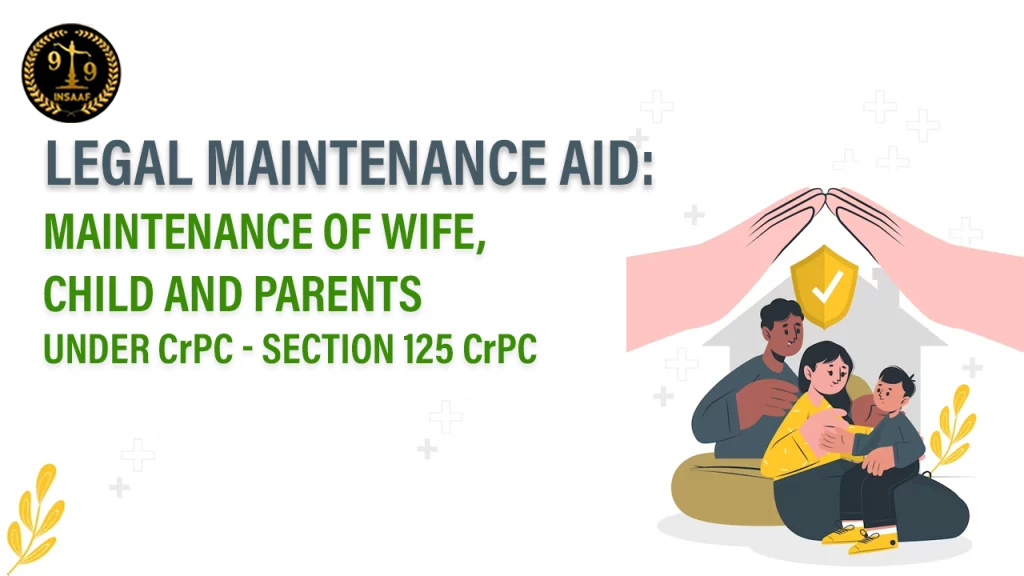

Online Legal Advice from Insaaf99® Online Lawyer Consultation in India


Online Legal Advice from Insaaf99® Online Lawyer Consultation in India

Maintenance under Section 125 of the Criminal Procedure Code (CrPC) is a legal provision that allows individuals, including wives, children, and parents, to seek financial support from their husbands, fathers, or sons if they are unable to sustain themselves. This provision aims to offer economic assistance to those who lack the means to support themselves, ensuring their ability to maintain a life of dignity and respect.
Section 125 of the Code of Criminal Procedure (CrPC) can be traced back to the colonial period in India. It was specifically designed to address the social and economic challenges faced by vulnerable individuals, particularly women and children, in a patriarchal society.
To guarantee financial support for dependents who are unable to provide for themselves, acting as a safety net and promoting social justice and gender equality.
Applicable in cases where individuals neglect or refuse to provide financial support to their wives, legitimate or illegitimate children, or destitute parents. Encompasses both married and unmarried wives. The court possesses discretionary powers to determine maintenance amounts based on the specific circumstances of each case.
Applications under Section 125 CrPC are filed before a Judicial Magistrate of the First Class, ensuring widespread accessibility. Plays a pivotal role in advancing gender equality, social welfare, and preventing destitution among dependents within the family structure.

Wife: This provision applies to a legally wedded wife, including divorced wives or widows, who are unable to support themselves.
Children: Minor children, whether legitimate or illegitimate, of the husband or father are entitled to claim maintenance.
Parents: Aged or infirm parents who lack the means to sustain themselves can also seek maintenance under this section.
Inability to Maintain Themselves: The claimant, whether a wife, child, or parent, must be unable to support themselves financially.
Sufficient Means of the Person: The person against whom the claim is made (husband, father, or son) should possess adequate financial means to provide maintenance.
Living Conditions: The claimant should not be living in adultery or willfully refusing to live with the person against whom the claim is made without a valid reason.
The calculation of maintenance for wives, as outlined in Section 125 CrPC, takes into account various critical factors. These factors encompass the specific needs of the wife, the financial capacity of the husband, the standard of living maintained during the marriage, economic indicators like inflation and price indices, and the requirements of any dependent children.
Section 125 CrPC provides the court with discretionary powers in the determination of maintenance amounts for wives. The court meticulously assesses the aforementioned factors to ensure a just and equitable evaluation. It aims to sustain a standard of living akin to that experienced during the marriage while considering the wife's necessities and the husband's financial capabilities.
Legal precedents, including notable cases such as "Savitri Pandey vs. Prem Chandra Pandey" and "Kuldip Kaur vs. Surinder Singh," offer valuable insights. These cases underscore the importance of maintaining a balance in setting the maintenance amount it should neither be excessive nor insufficient. The court seeks to strike a judicious equilibrium, accounting for the distinctive circumstances of each case.
The determination of maintenance amounts for wives under Section 125 CrPC hinges on the comprehensive assessment of diverse factors, with the court's discretionary authority ensuring an equitable and well-rounded judgment.
Wives initiating maintenance claims under Section 125 CrPC encounter a range of common challenges. Establishing proof of neglect or refusal by their husbands can be an arduous task, often necessitating substantial evidential support. Furthermore, a lack of legal acumen and the generally sluggish pace of legal proceedings contribute to the complexities faced by wives.
To address these impediments effectively, it is imperative for wives to meticulously gather supporting evidence and seek legal counsel to navigate this intricate terrain. Encouraging legal literacy and expediting the adjudication of maintenance cases can expedite the process and alleviate the financial burdens borne by wives. Additionally, initiatives centered on economic rehabilitation and skill development have the potential to empower wives to attain self-sufficiency, thus diminishing their reliance on maintenance claims.
In conclusion, Section 125 CrPC plays a pivotal role in India, acting as a vital safety net that ensures the financial well-being of wives and prevents destitution. Section 125 CrPC actively promotes gender equality, protects the rights of wives in diverse marital scenarios and secures their economic stability. For those grappling with maintenance-related issues, seeking legal counsel is imperative.
Section 125 CrPC reiterates the significance of financial security for wives, regardless of their marital status, and empowers them to assert their rights and dignity through legal channels. It stands as a cornerstone of support for those in need, fostering social justice and gender equity.
Also Read